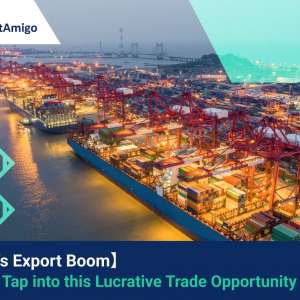Author Name: Tiffany Lee – Marketing Analyst at FreightAmigo
The Southeast Asian trade ecosystem has been a hub of dynamic activities, with Small and Medium Enterprises (SMEs) playing a pivotal role. SMEs have proven to be the backbone of Southeast Asia’s growing economy, contributing substantially to income generation, employment, and regional development. However, they also face a myriad of challenges that hinder their full potential.
Want To Compare The Best Express, Air Freight, Sea Freight, Rail Freight & Trucking Rates So As To Have Better Control On Cost?
The Nature of SMEs in Southeast Asia
SMEs in Southeast Asia are a diverse group, each with unique characteristics and contributions. They represent a significant chunk of the region’s economic output, accounting for 89% to 99% of total establishments across the ASEAN Member States (AMSs) and contributing to each AMS’s GDP between 30% and 53%.
The vitality of SMEs extends beyond their economic contribution. They have a widespread presence in non-urban and rural areas, playing a crucial role in gender and youth empowerment through diverse business participation.
Despite their importance, SMEs face significant challenges. The lack of a consistent and coherent definition of SMEs within and across countries, regulatory bodies, and professional institutions is one of the most pressing issues. This inconsistency complicates the formulation and implementation of supportive policies and regulations.
The Role of SMEs in the Southeast Trade Market
SMEs in Southeast Asia have shown remarkable resilience and capacity for innovation, making them key players in the region’s trade market. They have demonstrated the ability to adapt to changes in the global economic landscape and have capitalized on the opportunities created by the digitalization of the economy.
Particularly in the carbon trading market, SMEs have taken a lead role. With increasing global awareness about climate change and the need to reduce greenhouse gas emissions, the carbon trade market provides an avenue for SMEs to contribute to global sustainability efforts while also benefiting economically.
The Accountancy Landscape for ASEAN SMEs
The accountancy landscape for SMEs in Southeast Asia is as diverse as the SMEs themselves. Their accounting needs range from traditional reporting and compliance functions such as financial reporting and tax preparation to more advanced business advisory services.
Despite this diversity, common challenges emerge. Many SMEs lack the skills to understand, prepare, and utilize financial information for business decision-making. There is also limited access to basic business skills, financing, innovation, and technology.
The role of accountants in this landscape is crucial. They are often the first point of professional contact for SMEs, providing guidance and advice on business establishment and registration. As trusted business advisors, accountants can bridge the gap between SMEs and key stakeholders, facilitating communication and assisting SMEs in reaching their full potential.
The Future of SMEs in the Southeast Trade Market
Given the significant role SMEs play in the Southeast trade market, their future is closely tied to the region’s economic growth. However, to ensure their continued contribution and growth, several issues need to be addressed.
First, there is a need for a common and coherent definition of SMEs within the region. This would help in the formulation of supportive policies and regulations that are tailored to their unique needs and challenges.
Second, there is a need to enhance the financial literacy of SMEs. This would enable them to better understand and utilize financial information for business decision-making and strategic planning.
Finally, there is a need for more robust support services for SMEs. This includes access to finance, business advisory services, and technology. With these support services in place, SMEs would be better equipped to navigate the complex trade ecosystem and contribute to the region’s economic growth.
Conclusion
SMEs play a vital role in Southeast Asia’s trade market. They contribute significantly to income generation, employment, and regional development. However, they also face a myriad of challenges that hinder their full potential. By addressing these challenges and providing robust support services, SMEs can continue to be a driving force in the region’s economic growth.
The small and medium enterprise sector in the Southeast trade market is a dynamic and vital part of the region’s economy. As we move forward, it is crucial that we continue to support and empower these businesses to ensure their continued contribution to economic growth and development.
There Are Different Options For Cargo Transportation. If You Want To Choose The Most Convenient And Suitable Solution, It Is Best To Have The Full Support Of Logistics Experts! If You Are Planning To Ship Goods Overseas, Please Go To The FreightAmigo Page For Inquiries.
===
Read More:
【Logistics News】Singapore to Sign Declaration on Green Shipping Corridors
FreightAmigo Won Startup Grand Award In TechChallenge — Digitising Trade Finance
Sailing Schedule: Streamlining Logistics Operations for Efficient Shipments
===
If you have any inquiries on logistics/supply chain, feel free to contact FreightAmigo now:
Chat with us online OR
Phone : +852 28121686
WhatsApp: +852 27467829



